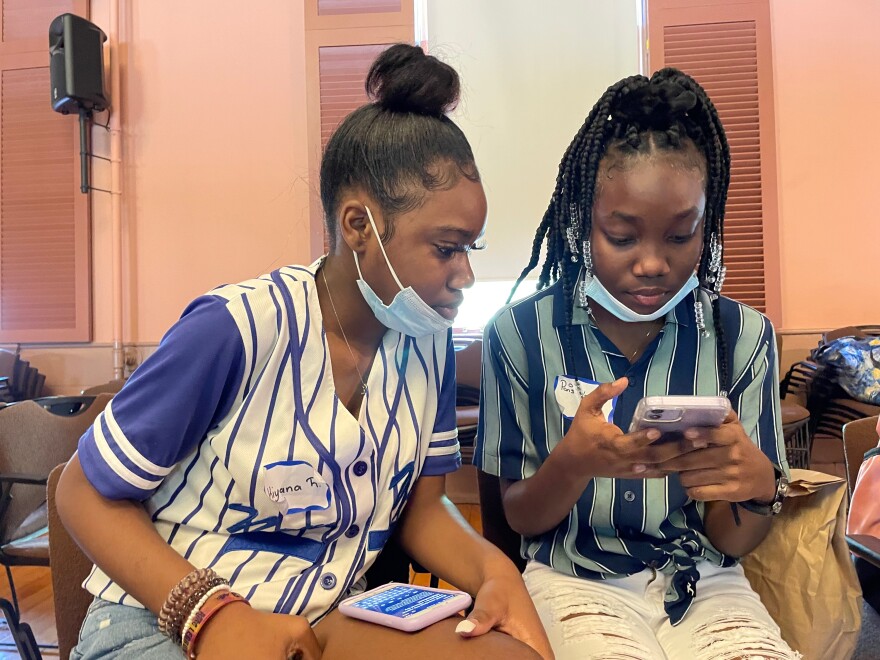High School students from across the Cape got a crash course in climate change and civic engagement this month. It's part of an ambitious effort to raise the consciousness and confidence of a few dozen jittery teenagers who start the day milling around an upstairs room in Sandwich Town Hall.
They come from Falmouth, Yarmouth, Dennis, Barnstable, and beyond, and organize themselves by school. It’s immediately clear: at this Youth Climate Action Summit, some know their stuff.
They disparage “technocentric” climate mitigation strategies, rail over the injustice of climate change disproportionately impacting Black and brown communities, and share plans to get PhDs in fields like entomology.
But 15-year-old Kiyana Richards doesn’t consider herself a climate activist. Far from it. And, like most teenagers, the freshman from Dennis has never attended a town hall meeting or spoken with elected officials.
“Most of the people that were here – they already knew what climate change was. And they were already advanced,” she says. “When they were asking questions, I was like, ‘Um, what?!’”
Today, the 60-odd students in attendance are tasked with answering a mock question in front of a mock select board: Should historic Route 6A in Sandwich be turned into canals – a la Venice, Italy – to accommodate rising sea levels?
Richards, who’s got long eyelashes and manicured nails, says she might be too nervous to speak, but sees value in learning how.
“Lately I've been, like, going to a lot of [school] meetings,” she says. “I guess it would be good to learn how to go to a town hall meeting since I'm kind of exploring right now.”

To be clear, no one is suggesting the town of Sandwich spend millions – even billions – of dollars digging up Cape Cod roads to build canals. But organizers say that’s the point. Their goal is simple but two-pronged. They want to teach students how to envision a society that’s adapting to climate change, and teach them how to influence town government.
Today, those students will have to stand at a podium and share their opinions in front of strangers – something many adults have never tried.
“This is an incredibly inclusive form of democracy. It’s kind of like the origin of our American democracy,” says Ella Sampou, a community organizer, climate activist, and the brain behind this exercise. “It’s such a privilege and a luxury to be able to look your local elected official in the eye and ask for something. And despite how inclusive it is, there are still so many voices in our community that get left out.”
The 27-year-old went to school on the Cape, and is now determined to empower the next generation. At least, that’s the hope, as she tries to wrangle the room.
“So I'm going to put a timer on,” she calls out over the chattering of students. “We're going to think about what we're saying. We're going to talk about it. And then we're going to start giving our public comments. Okay?”
Students break off into groups and start working. Right away, 17-year-old Maeve Pappas is dialed in. The pink-haired-teen from Sandwich says connecting with other kids who care about the climate makes her feel less alone.
“Sea level rise is going to happen,” she says. But salt marshes store carbon and can help communities protect themselves against sea level rise, storms and flooding. So, she continues, why not instead invest in “protecting the marshes we have now and making a movement for people to stop destroying our marsh?”
“So, like, nature-based mitigation?” another student quips.
“Yes!” Maeve replies.
Getting teenagers to talk to each other about climate change is “thrilling” for clinical psychologist Kelsey Hudson, a Boston University- affiliated specialist for climate distress in children and adolescents. She wasn’t involved in planning the event, but admires the results.
“Building up agency, social connection, collective action,” she says. “There are all sorts of elements within a day like this that are really consistent with what we hope for young people coping with climate distress.”
But while climate distress is one thing, for many people, just getting up on stage is a daunting prospect, especially for first-time speaker Kiyana Richards.
“Alright guys,” Sampou announces. “This fake hearing has been called to order.”
One by one, students head to the podium and state their case: on one hand, boaters might pollute the canal with plastic and fuels that would harm marine life, and changing the area so drastically could could devastate small businesses. But on the other hand, a few point out, creating a mini-Venice on Cape Cod might actually bring in new tourism dollars.
Richards listens intently. She may not have all the answers, but this she knows: Sandwich is not and will never be an Italian city. So finally, five hours after she first arrived at the summit, it’s her turn at the podium to say so.
“Hi. My name’s Kiyana Richards. I’m from [Dennis-Yarmouth Regional High School]. Thank you for having me speak today,” she begins quietly. Then she lays out her unique case against canals. She says people might not be able to afford boats to cruise down Route 6A, so there’d be more cars on fewer roads, which could cause more traffic accidents.
“And it could also increase vehicle emissions,” she concludes.
She steps down from the podium and the room breaks into applause. A few more students speak after her, but she doesn’t hear them. She sneaks off to call her mom and share what she’s just accomplished.
“As I went up there, it wasn't as scary as I thought it would be,” she reflected as students began filing out of Town Hall.
Not only has she gained new insight into the climate crisis, she says, but also more confidence that her voice could one day bring real change to her community and the world beyond.
“It was more like, ‘Okay, period,’” she says, laughing. “I did this.”








